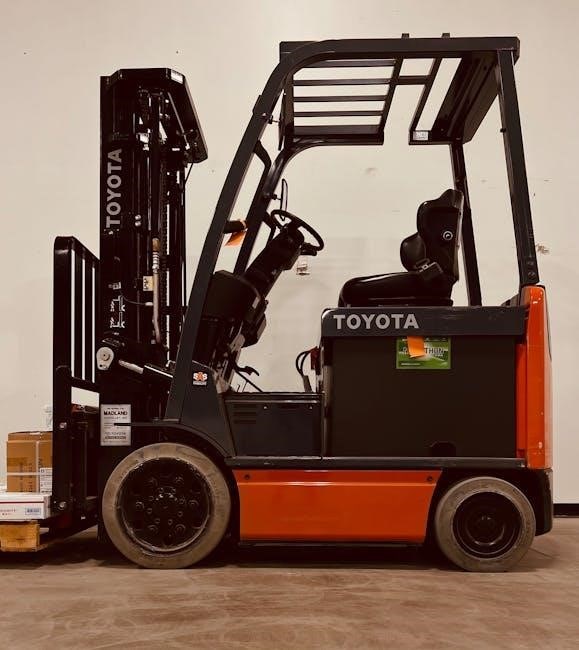yale forklift owners manual
Welcome to the Yale Forklift Owner’s Manual. This guide provides essential information for safe and efficient operation, drawing on Yale’s 140 years of experience in material handling. It offers detailed insights into model-specific features, maintenance routines, and safety protocols, ensuring optimal performance and longevity of your forklift.
1.1 Overview of Yale Forklift Models
Yale offers a diverse range of forklift models, including electric, diesel, and gas-powered options, designed for various industrial applications. Popular models like the ERC070HG, ERC040-065GH, and GDP25LX are known for their reliability and productivity. Each model is tailored to specific lifting capacities and operational needs, ensuring versatility across different work environments. Yale’s commitment to innovation is reflected in its extensive lineup, catering to both small and large-scale operations.
1.2 Importance of the Owners Manual
The Yale Forklift Owner’s Manual is a critical resource for operators and maintenance personnel. It contains essential information on safety guidelines, operating procedures, and maintenance schedules. Adhering to the manual ensures compliance with industry standards, prevents accidents, and extends the lifespan of the equipment. Regularly updated, it serves as a comprehensive guide for optimal performance and troubleshooting, making it indispensable for efficient forklift management.
Safety Guidelines and Precautions
Adhering to safety guidelines is crucial for preventing accidents and ensuring smooth operations. Always follow warning symbols, wear protective gear, and avoid operating on public roads without authorization.
2;1 General Safety Practices
Always follow safety guidelines to minimize risks. Operators must be trained, understand warning symbols, and ensure the forklift is in good condition. Regular inspections and proper maintenance are essential. Never operate on public roads without authorization and always be aware of surroundings. Adhering to these practices ensures safe and efficient forklift operation, protecting both the operator and the workplace environment.
2.2 Warning Symbols and Their Meanings
Warning symbols in the Yale Forklift manual are critical for operator safety. They indicate potential hazards, such as mechanical risks or operational dangers. Understanding these symbols is essential for safe operation. Familiarize yourself with their meanings, as they are standardized and consistently used across all Yale manuals. Refer to the manual for detailed explanations to ensure proper interpretation and adherence to safety protocols.

Operating Instructions
Understand the controls, starting, and stopping procedures. Familiarize yourself with safety practices and operational guidelines to ensure efficient and safe forklift operation, as detailed in the manual.
3.1 Controls and Instrumentation
Yale forklifts feature ergonomic controls designed for intuitive operation. Instrumentation includes digital displays for monitoring battery levels, error codes, and operational status. Operators can access essential functions like lifting, steering, and hydraulic controls with ease. Safety indicators and alarms provide real-time feedback, ensuring safe and efficient operation. Understanding these controls is crucial for optimal performance and adherence to safety protocols.
3.2 Starting and Stopping Procedures
Proper starting and stopping procedures ensure safe and efficient forklift operation. Begin with a pre-start inspection, then use the ignition key or start button to power on. Follow manufacturer guidelines for gradual acceleration and controlled braking. When stopping, secure the load, apply brakes, and complete shutdown procedures. Always refer to the manual for model-specific instructions to ensure safety and equipment longevity.
Maintenance and Servicing
Regular maintenance is crucial for optimal forklift performance. Use genuine Yale parts and follow guidelines for routine checks, battery care, and hydraulic system inspections to ensure longevity and efficiency.
4.1 Routine Maintenance Checks
Regular maintenance checks are vital for ensuring the safety and efficiency of your Yale forklift. Inspect the battery, tires, hydraulic systems, and control mechanisms frequently. Lubricate moving parts and check fluid levels. Address any wear or damage promptly to prevent breakdowns. Always use genuine Yale parts for replacements to maintain performance and longevity. Schedule professional inspections periodically to ensure compliance and optimal functionality.
4.2 Battery Care and Maintenance
Proper battery care ensures optimal performance and longevity. Regularly charge the battery fully and avoid overcharging. Check electrolyte levels and top up with distilled water as needed. Clean terminals to prevent corrosion. Store batteries in a cool, dry place when not in use. Always use genuine Yale parts and follow the manufacturer’s guidelines for maintenance and replacement to ensure reliability and safety.
4.3 Tire and Hydraulic System Checks
Regular tire inspections ensure safety and efficiency. Check for wear, damage, and proper inflation levels. For hydraulic systems, monitor fluid levels and look for leaks or contamination. Ensure all hydraulic lines are secure and functioning correctly. Refer to the manual for specific guidelines on tire pressure and hydraulic fluid specifications to maintain optimal performance and prevent potential failures.

Troubleshooting Common Issues
Identify and address common forklift issues promptly. Check error codes, hydraulic system performance, and electrical connections. Refer to diagnostic guides for solutions and maintenance steps.
5.1 Identifying Error Codes
Yale forklift error codes are crucial for diagnosing issues. Refer to the manual or diagnostic guides for specific code meanings. Models like ERC070HG provide detailed code lists. Ensure to address each code promptly, as they indicate malfunctions in systems like hydraulics or electronics. Consult the service manual or contact Yale support for unresolved issues to maintain optimal performance and safety.
5.2 Resolving Hydraulic System Problems
Hydraulic issues in Yale forklifts often stem from fluid leaks or system blockages. Regular fluid checks and filter replacements can prevent such problems. If a hydraulic malfunction occurs, consult the service manual for troubleshooting steps. Avoid operating the forklift until repairs are made to prevent further damage. Genuine Yale parts are recommended for reliable fixes and optimal performance.
Parts and Accessories
Yale forklifts require genuine parts for optimal performance. Explore Yale’s catalog for authentic components, ensuring reliability and durability. Accessories like hydraulic parts and tires are available through authorized dealers.
6.1 Understanding the Parts Catalog
The Yale Forklift Parts Catalog provides a comprehensive guide to components, including detailed illustrations and part numbers. It helps identify genuine parts, ensuring compatibility and performance. Users can navigate through categorized sections, from hydraulic systems to tires, making it easier to locate specific parts. Regular updates ensure accuracy, while clear descriptions aid in selecting the right accessories for maintenance and repairs.
6.2 Genuine vs. Aftermarket Parts
Genuine Yale parts are engineered to meet precise specifications, ensuring optimal performance and longevity. Aftermarket parts may offer cost savings but often lack manufacturer quality assurance. Genuine components are designed for seamless integration and durability, reducing the risk of compatibility issues and premature wear. For reliable operation, Yale recommends using authentic parts to maintain safety and efficiency standards.
Yale Forklift History and Innovation
Yale Materials Handling Corporation, with a 140-year legacy, has evolved into a leader in innovative handling equipment. Founded in 1868 by Linus Yale, the brand consistently pioneers advancements in lift truck technology, blending reliability with productivity to meet modern demands.
7.1 Evolution of Yale Forklifts
Yale Forklifts, established in 1868 by Linus Yale, began with lock innovations before expanding into material handling. Over the years, Yale transitioned from mechanical to electric models, introducing iconic designs like the ERC070HG. Their commitment to innovation and productivity has led to cutting-edge technologies, solidifying their reputation as a pioneer in lift truck manufacturing and a leader in modern material handling solutions.
7.2 Technological Advancements
Yale Forklifts have embraced cutting-edge innovations, integrating automation, robotics, and green energy solutions. Advanced models feature lithium-ion batteries, energy-efficient motors, and smart technologies for real-time monitoring. These advancements enhance productivity, reduce emissions, and ensure compliance with environmental regulations, solidifying Yale’s leadership in sustainable and high-performance material handling solutions for modern industries.
Compliance and Regulatory Standards
Yale forklifts are designed to meet strict industry standards and regulations, ensuring safety and environmental compliance. The manual details necessary guidelines for operators to adhere to these requirements effectively.
8.1 Industry Standards for Forklifts
Yale forklifts comply with global industry standards, including OSHA and ISO regulations. These standards ensure safety, efficiency, and reliability in design and operation. The manual outlines how each model meets these requirements, providing operators with a clear understanding of compliance measures. Adherence to these standards is crucial for workplace safety and legal operation of the equipment.
8.2 Environmental Regulations
Yale forklifts are designed to meet strict environmental regulations, ensuring eco-friendly operation. Models feature energy-efficient technologies and reduced emissions, aligning with global sustainability standards. The manual emphasizes the importance of maintaining these eco-friendly practices and outlines Yale’s commitment to minimizing its environmental footprint through innovative solutions and responsible manufacturing processes.
Environmental Impact and Sustainability
Yale forklifts are designed with a focus on sustainability, offering eco-friendly models and energy-efficient technologies to minimize environmental impact while maintaining high performance and productivity standards.
9.1 Eco-Friendly Forklift Models
Yale offers eco-friendly forklift models designed to reduce environmental impact while maintaining high performance. Electric forklifts, such as the ERC040-065GH series, provide energy-efficient solutions with lower emissions. These models incorporate sustainable technologies, aligning with environmental regulations and promoting greener warehouse operations. Yale’s commitment to eco-friendly designs ensures reduced carbon footprints without compromising productivity or reliability.
9.2 Sustainable Maintenance Practices
Yale promotes sustainable maintenance practices to minimize environmental impact. Regular checks ensure energy-efficient operation, while proper disposal of waste materials aligns with eco-friendly standards. Using genuine parts and adhering to maintenance schedules reduces resource consumption and extends equipment lifespan. These practices support Yale’s commitment to sustainability, ensuring eco-conscious forklift ownership and operation.

Future Trends in Forklift Technology
Yale invests in innovation, focusing on automation, AI, and IoT integration. Future trends include advanced data analytics for predictive maintenance and energy-efficient solutions, enhancing operational efficiency.
10.1 Automation and Robotics
Yale is advancing automation and robotics to enhance efficiency in material handling. Automated guided vehicles and robotic lifting solutions are transforming warehouse operations, offering precision and reduced downtime. These technologies integrate with existing systems, optimizing workflows and reducing operational costs. Yale’s commitment to innovation ensures they remain at the forefront of these advancements, providing sustainable and intelligent solutions for modern logistics.
10.2 Green Energy Solutions
Yale is committed to sustainable practices, offering eco-friendly forklift models that reduce environmental impact. Electric and alternative fuel-powered lift trucks are central to their green energy initiatives. These solutions minimize emissions and energy consumption, aligning with global environmental goals. Yale’s focus on green energy underscores their dedication to innovation and sustainability, ensuring their products meet future ecological standards while maintaining high performance.

Where to Find Yale Forklift Manuals
Yale forklift manuals are available on official Yale websites, third-party providers like Manua.ls, and eBay. These platforms offer PDF downloads for various models, ensuring easy access.
11.1 Official Yale Websites
Official Yale websites are the primary source for genuine forklift manuals. They offer a wide range of models, including the ERC070HG and others, ensuring easy access to detailed guides. Users can download PDF versions directly, providing comprehensive information on operation, maintenance, and troubleshooting. These manuals are regularly updated, guaranteeing accuracy and relevance for optimal equipment performance and safety.
11.2 Third-Party Manual Providers
Third-party manual providers like Manua.ls and eBay offer a wide range of Yale forklift manuals. These platforms provide easy access to service, parts, and operating manuals for various Yale models. While convenient, ensure the authenticity and accuracy of the manuals to avoid errors. Popular models like the ERC070HG are frequently available through these sources, catering to both operators and technicians.
Best Practices for Manual Usage
Always read and understand the manual thoroughly before operating. Regularly update your manual to ensure compliance with new guidelines. Adhere to safety symbols and manufacturer recommendations for optimal efficiency and safety. Familiarize yourself with operational and maintenance procedures outlined in the manual to maximize performance and longevity of your Yale forklift.
12.1 Regular Manual Updates
Regularly updating your Yale Forklift Owner’s Manual ensures compliance with the latest safety standards and operational guidelines. Check official Yale websites or authorized dealers for updates, as new models or regulations may require revisions. Updated manuals often include enhanced safety protocols, improved maintenance procedures, and technical advancements.
Operators should review updates promptly and implement necessary changes to maintain optimal performance and safety. This proactive approach ensures your forklift operates efficiently and adheres to industry standards, reducing potential risks and extending equipment lifespan.
12.2 Training Programs for Operators
Yale forklift training programs ensure operators master safe and efficient equipment handling. These programs cover essential safety protocols, operational best practices, and maintenance basics. Regular training updates align with manual revisions, reinforcing compliance and productivity. Operators gain hands-on experience and theoretical knowledge, reducing accidents and enhancing workplace safety. Yale recommends enrolling in certified training courses available through authorized dealers or online platforms.
Common Mistakes to Avoid
Common mistakes include ignoring safety protocols, incorrect maintenance practices, and not following manual guidelines. These oversights can lead to accidents and equipment damage, emphasizing the need for adherence.
13.1 Ignoring Safety Protocols
Ignoring safety protocols is a critical mistake that can lead to severe accidents and equipment damage. Overlooking warning symbols, failing to perform pre-operation checks, and neglecting proper training are common violations. These oversights jeopardize operator and bystander safety, emphasizing the importance of adhering to guidelines to ensure safe and efficient forklift operation.
13.2 Incorrect Maintenance Practices
Incorrect maintenance practices can lead to equipment malfunctions and safety hazards. Neglecting routine checks, improper battery care, and using non-genuine parts are common mistakes. These oversights can void warranties and compromise performance. Always follow Yale’s maintenance guidelines to ensure longevity and reliability of your forklift, preventing costly repairs and ensuring operator safety.
This manual provides comprehensive guidance for Yale forklift owners, emphasizing safety, maintenance, and operational best practices. By following these guidelines, users ensure optimal performance, longevity, and responsible equipment ownership.
14.1 Summary of Key Points
This manual serves as a comprehensive guide for Yale forklift owners, covering safety protocols, operational best practices, and maintenance routines. It emphasizes the importance of adhering to manufacturer guidelines to ensure optimal performance, longevity, and compliance with industry standards. Key topics include proper handling techniques, routine inspections, and troubleshooting common issues to maintain efficiency and safety in various work environments.
14.2 Final Thoughts on Manual Usage
The Yale Forklift Owner’s Manual is a vital resource for ensuring safe, efficient, and compliant operation. By following its guidelines, users can enhance productivity, reduce risks, and prolong equipment lifespan. Regular updates and adherence to maintenance schedules are crucial for optimal performance. Embrace continuous learning and stay informed about Yale’s innovations to maximize the benefits of your forklift investment and maintain workplace safety.

Additional Resources
Yale offers extensive support through official websites and third-party providers. Explore customer support, online forums, and communities for troubleshooting, manuals, and expert advice to enhance your forklift experience.
15.1 Yale Customer Support
Yale provides comprehensive customer support through its official website and authorized dealers. Operators can access troubleshooting guides, maintenance tips, and parts inquiries. The support team offers assistance with manual downloads, error codes, and technical queries. Yale’s customer service ensures timely resolution of issues, enhancing operational efficiency and equipment longevity. Reach out via phone, email, or online portals for personalized assistance and expert guidance.
15.2 Online Forums and Communities
Online forums and communities provide valuable resources for Yale forklift owners. Platforms like Manua.ls and eBay offer access to manuals, troubleshooting guides, and user discussions. These forums foster collaboration, allowing operators to share experiences, resolve issues, and gain insights. They also host detailed parts catalogs, wiring diagrams, and maintenance tips, making them indispensable for DIY repairs and optimizing forklift performance.
Final Remarks
The Yale Forklift Owner’s Manual is a vital resource for optimal equipment performance and longevity. It ensures safety, efficiency, and compliance, guiding users through proper operation and care. By following the manual, operators can maximize productivity while maintaining workplace safety. Stay updated with Yale’s latest innovations for continued excellence in material handling.
16.1 Importance of Continuous Learning
Continuous learning is crucial for mastering Yale forklift operations. As technology advances, staying updated ensures operators understand new features and safety protocols. Regular training programs and manual updates help maintain efficiency and safety standards. By embracing lifelong learning, operators can adapt to industry changes, optimize equipment performance, and contribute to a safer, more productive workplace. Yale’s resources support ongoing education for operational excellence.
16.2 Staying Updated with Yale Innovations
Staying updated with Yale innovations is essential for optimizing forklift performance and safety. Yale continuously introduces advancements like automation and green energy solutions. The company provides regular manual updates, service alerts, and online platforms for easy access to the latest information. By staying informed, operators can enhance efficiency, reduce downtime, and ensure compliance with industry standards. Engaging with Yale’s forums and support supports continuous improvement.
